
Serbia, officially the Republic of Serbia, is a landlocked country at the crossroads of Southeast and Central Europe, located in the Balkans and the Pannonian Plain. It shares land borders with Hungary to the north, Romania to the northeast, Bulgaria to the southeast, North Macedonia to the south, Croatia and Bosnia and Herzegovina to the west, and Montenegro to the southwest. Serbia claims a border with Albania through the disputed territory of Kosovo. Serbia has about 6.6 million inhabitants, excluding Kosovo. Its capital Belgrade is also the largest city.
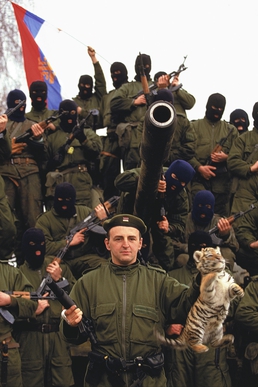
Željko Ražnatović, better known as Arkan, was a Serbian war criminal, mobster and head of the Serb paramilitary force called the Serb Volunteer Guard during the Yugoslav Wars.
Adria Airways d.o.o. was the flag carrier of Slovenia, operating scheduled and charter services to European destinations. The company's head office was at Ljubljana Jože Pučnik Airport in Zgornji Brnik, Cerklje na Gorenjskem, near Ljubljana. On 30 September 2019, the airline declared bankruptcy and ceased all operations.

Avala is a mountain in Serbia, overlooking Belgrade. It is situated in the south-eastern corner of the city and provides a great panoramic view of Belgrade, Vojvodina and Šumadija, as the surrounding area on all sides is mostly lowlands. It stands at 511 metres (1,677 ft) above sea level, which means that it enters the locally defined mountain category just by 11 m (36 ft).

The economy of Serbia is a service-based upper-middle income economy in the Central Europe, with the tertiary sector accounting for two-thirds of total gross domestic product (GDP). The economy functions on the principles of the free market. Nominal GDP in 2024 is projected to reach $81.694 billion, which is $12,400 per capita, while GDP based on purchasing power parity (PPP) stood at $182.306 billion, which is $27,600 per capita. The strongest sectors of Serbia's economy are energy, the automotive industry, machinery, mining, and agriculture. The country's primary industrial exports are automobiles, base metals, furniture, food processing, machinery, chemicals, sugar, tires, clothes, and pharmaceuticals. Trade plays a major role in Serbian economic output. The main trading partners are Germany, Italy, Russia, China, and neighbouring Balkan countries.

Košutnjak is a park-forest and urban neighborhood of Belgrade, the capital of Serbia. It is divided between in the municipalities of Čukarica and Rakovica. With the adjoining Topčider, it is colloquially styled "Belgrade's oxygen factory". The 1923 Belgrade's general plan, in which one of the main projects regarding the green areas was forestation of the area between Topčider and the city, envisioned a continuous green area Senjak – Topčidersko Brdo – Hajd Park – Topčider – Košutnjak, which was formed by the 1930s. This continual forested area makes the largest "green massif" in the immediate vicinity of Belgrade's urban tissue.

The Republic Square or the Square of the Republic is one of the central town squares and an urban neighborhood of Belgrade, located in the Stari Grad municipality. It is the site of some of Belgrade's most recognizable public buildings, including the National Museum, the National Theatre and the statue of Prince Michael.

Terazije is the central town square and the surrounding neighborhood of Belgrade, Serbia. It is located in the municipality of Stari Grad.
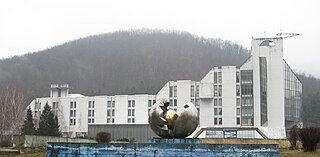
Kuršumlijska Banja is a spa town located in the municipality of Kuršumlija, in south Serbia. Known for its springs already in Roman times, it was declared a royal spa in 1922, becoming one of the most visited and most developed spas in Serbia during Interbellum. As of 2011 census, the town has a population of 106 inhabitants.

Bulevar kralja Aleksandra is the longest street entirely within the urban limits of Serbian capital Belgrade, with length of 7.5 kilometers. Known for decades after World War II as Bulevar Revolucije, it is so distinct in the Belgraders' hearts and minds that they simply refer to it as the Bulevar, although there are 20 boulevards in Belgrade.
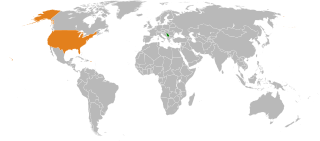
Relations between Serbia and the United States were first established in 1882, when Serbia was a kingdom. From 1918 to 2006, the United States maintained relations with the Kingdom of Yugoslavia, the Socialist Federal Republic of Yugoslavia, and the Federal Republic of Yugoslavia, of which Serbia is considered the legal successor.

Montenegrin–Serbian relations are foreign relations between Montenegro and Serbia. From 1918 until 2006, the two states were united under the Kingdom of Yugoslavia, the Socialist Federal Republic of Yugoslavia, and Serbia and Montenegro. Since 2006, there have been sporadic instances of debate on Montenegro's legitimacy as a separate state as well as much more prominent controversial debate on the Montenegrin ethnic identity. Despite this, the two countries have maintained mostly friendly geopolitical and economic relations.

The May Coup was a coup d'état involving the assassination of the Serbian King Alexander Obrenović and his consort Queen Draga inside the Royal Palace in Belgrade on the night of 10–11 June [O.S. 28–29 May] 1903. This act resulted in the extinction of the Obrenović dynasty that had ruled the Kingdom of Serbia since the middle of the 19th century. A group of Serbian Army officers led by captain Dragutin Dimitrijević (Apis) organized the assassination. After the May Coup, the throne passed to King Peter I of Serbia.

Siniša Mali is a Serbian economist and politician serving as deputy prime minister of Serbia since 2022 and as minister of finance since 2018. A member of the Serbian Progressive Party (SNS), he previously served as mayor of Belgrade from 2014 to 2018, and as the president of the Temporary Council of Belgrade from 2013 to 2014. Following the dismissal of Rade Basta in June 2023, he also served as acting minister of economy.
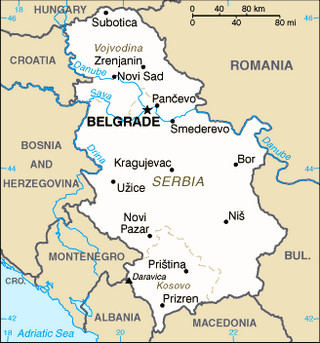
Tourism in Serbia is officially recognized as a primary area for economic and social growth. The hotel and catering sector accounted for approximately 2.2% of GDP in 2015. Tourism in Serbia employs some 120 000 people, about 4.5% of the country's workforce. In recent years the number of tourists is increasing. In 2019, tourism generated an income of nearly $1.698 billion, hosting 1.85 million tourists. Chinese tourists were the most numerous visitors, followed by tourists from Bosnia and Herzegovina, Bulgaria, Turkey, and Germany. In 2022, tourism earnings surged to $2.71 billion and almost 2 million tourists visited the country. Major destinations for foreign tourists are Belgrade, Novi Sad and Niš, while domestic tourists prefer spas and mountain resorts. Eco-friendly and sustainable tourism has also become very popular among domestic tourists, with many visiting various nature reserves and parks in the western and southern part of the country. Serbia is also known for gastronomic tourism, with Belgrade being the central meeting point with over 2000 restaurants, coffee shops, bars and nightlife venues.

Vlada Ilić was a Serbian merchant, industrialist, and politician, who, as a mayor of Belgrade, from 1935 to 1939 oversaw the unprecedented development of the city. Named the "first modern mayor of Belgrade", he is today probably best remembered as the founder of the Belgrade Zoo.

Industrija mesa Matijević is a Serbian meat industry holding company with the headquarters in Novi Sad, Serbia. As of December 2017, it has a total of 41 companies within its holding, which performs a variety of services, such as agribusiness, wholesale and real estate.

Tadija R. Sondermajer was a Serbian aviator, aeronautical engineer and a pioneer of Yugoslav aviation.
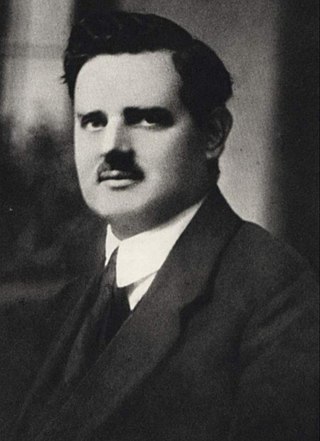
Filip Filipović was a Serbian mathematician, one of the founders of the Communist Party of Yugoslavia and its first secretary. He spent most of his last ten years in the Soviet Union, where he was executed during the Great Purge.



















